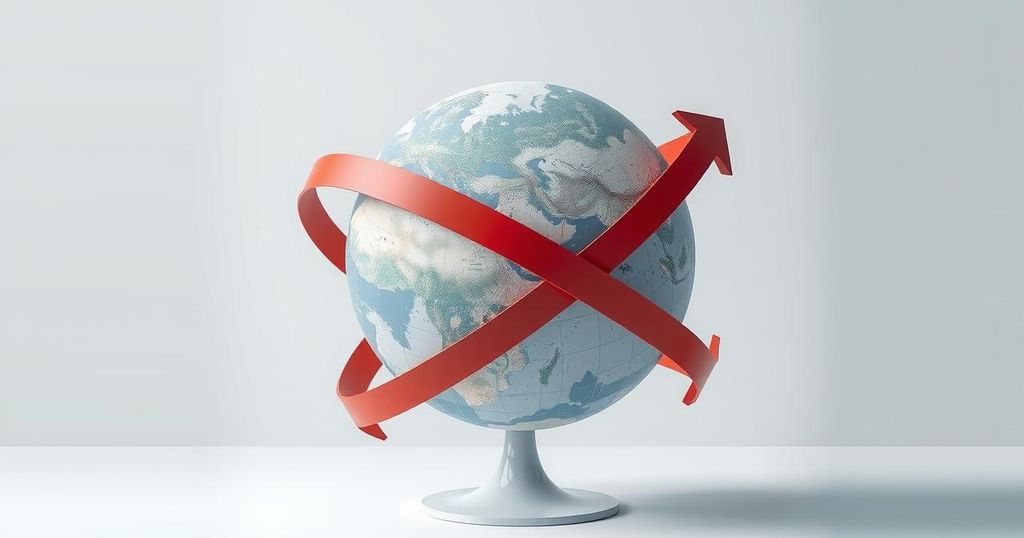ECOWAS Faces Challenges in Addressing Political Crisis in Guinea-Bissau
President Umaro Mokhtar Sissoco Embaló has faced increasing political unrest in Guinea-Bissau following his dissolution of parliament in December 2023, leading to opposition threats of protests. The Supreme Court’s controversial extension of his term and Embaló’s fluctuating decisions concerning re-election further complicate the political scenario. An ECOWAS delegation’s mediation attempt failed amidst hostility, raising concerns about the regional organization’s authority and intervention capabilities.
In December 2019, President Umaro Mokhtar Sissoco Embaló won the presidential elections, commencing a five-year term with re-election intentions for 2025. However, recent developments ensue as he dissolved the parliament in December 2023 without calling for new elections, prompting opposition parties to accuse him of undermining the democratic process, threatening mass protests if an election date is not established.
A contentious issue has arisen regarding the conclusion of Embaló’s term. Opposition leaders argue that his mandate ends on February 27, 2025, per the constitution, while the Supreme Court controversially extended this date to September 4, 2025. The opposition has vehemently opposed this judicial decision.
In September 2024, Embaló indicated he would not pursue a second term but later suggested he might reconsider post-consultations with his family. Consequently, the political climate in Guinea-Bissau has escalated into volatility, with unpredictable consequences anticipated.
On March 3, 2025, an ECOWAS delegation attempted to mediate the escalating situation, but their efforts were abruptly halted when President Embaló rejected their presence and cautioned them against interference in the nation’s internal matters. This incident raised alarm over Embaló’s escalating defiance towards ECOWAS’s role.
President Embaló subsequently informed French President Emmanuel Macron of his intent to seek re-election, indicating a preference for French intervention over that of ECOWAS. This choice implies a potential shift in alliances and raises questions about the efficacy of ECOWAS’s engagement in the crisis compared to its previous interventions in The Gambia and Niger.
The ongoing silence from ECOWAS presents significant concerns regarding its authority in reinstating stability in Guinea-Bissau. The actions, or inactions, surrounding this situation will set a precedent for future interventions across West Africa, highlighting the necessity for clear definitions regarding internal affairs and external interventions.
Moreover, President Embaló, who previously led the regional body, has displayed alarming neglect in addressing the political turmoil. The internal disarray poses grave risks for national stability and leaves Embaló in a precarious position potentially even vulnerable to a coup.
As the situation unravels, one must consider whether Embaló has the backing of France or if he relies solely on personal ties with President Macron. Seeking guidance from Senegal’s President Macky Sall could illuminate the reliability of external support amidst rising instability. Ultimately, the decisions made by President Embaló will not only impact Guinea-Bissau’s future but also test the credibility and effectiveness of ECOWAS in maintaining peace in West Africa.
The evolving political crisis in Guinea-Bissau under President Umaro Mokhtar Sissoco Embaló poses critical challenges for both his administration and regional stability. His controversial dissolution of parliament and the impending elections have fueled tensions with opposition parties. Moreover, the ambiguous role of ECOWAS raises questions regarding its influence and intervention strategies, while the prospect of foreign intervention adds further complexity to the situation. The upcoming decisions taken by President Embaló will significantly shape the political landscape in Guinea-Bissau and influence the credibility of regional governance.
Original Source: thepoint.gm




Post Comment